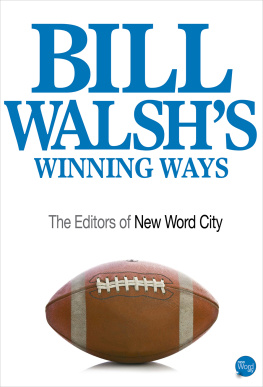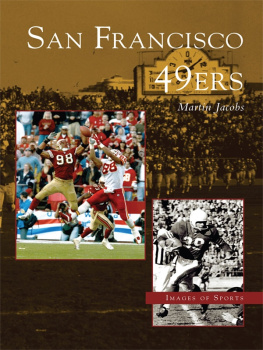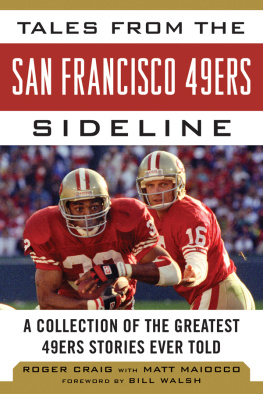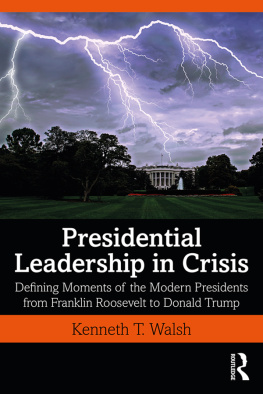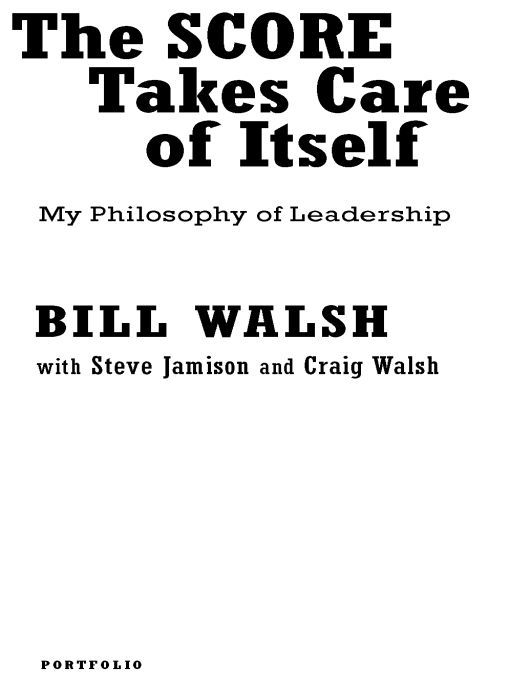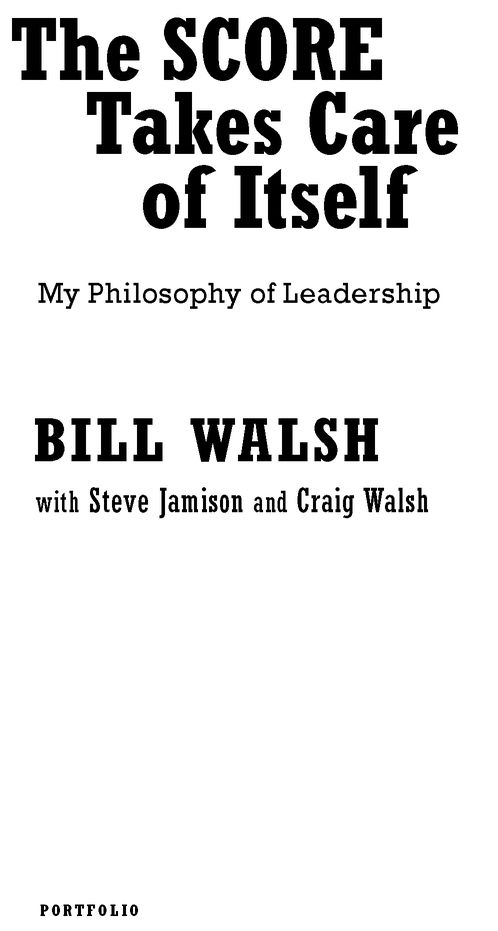Table of Contents
Acknowledgments
Craig Walsh
My father would want to acknowledge and thank Eddie DeBartolo Jr., the only owner who had the foresight and courage to give Bill Walsh a chance to be a head coach in the NFL.
He would also want to express his deep dedication and appreciation to all the people who wore the San Francisco 49er uniform both on the field or offthe entire organization who helped make a dream come true.
I would also like to dedicate our book to my children, Nate and Saman tha. I know their grandfather is very proud of them just as they are proud of him. This book is also dedicated to my mother, Geri, my sister, Elizabeth, and the memory of my brother, Steve.
Steve Jamison
The Score Takes Care of Itself is dedicated with a lot of love to my mother, Mary Jean Edstrom. And, to my father, Everett, his brother, Harold, and their friend Roger Busdicker who created magic when they created Hal Leonard Publishingmy introduction to the world of publishing. Also, to Bill Walsh, Coach John Wooden, Uncle Roy Stark, David Varner, Aunt Jo Edstrom. And, lest we forget, the great publishing mind of Jeffrey Krames made it all happen.
Running a football franchise is not unlike running any other business: You start first with a structural format and basic philosophy and then find the people who can implement it.
BILL WALSH
A Leaders Book for Leaders
Craig Walsh
My father, Bill Walsh, was one of the NFLs pivotal figures, a leader, head coach, and general manager whose innovations changed the way football is played and whose San Francisco 49er dynastyfive Super Bowl championships in fourteen yearsranks among the great achievements in sports history. The Score Takes Care of Itself is his very personal and, at times, painful account of the leadership lessons he learned during his life as well as his conclusions on how they might be useful in overcoming your own challenges as a leader.
Obviously, every profession has many elements unique unto itself. Nevertheless, when it comes to the fundamentals of effective leadership in the context of human nature and managing people, there are great parallels among the NFL, corporate America, or a grocery store with twelve employees. At least, Bill Walsh thought so.
The applicability of what he did in the NFL to the world of business is attested to by the fact that many CEOs in Silicon Valley and elsewhere not only were among his friends but also sought his advice and invited him to speak about leadership to their executive teams. After his retirement as head coach of the San Francisco 49ers, he did the same at Stanford University, where he gave lectures on leadership to graduate students at the business school. The Harvard Business Review, Forbes, and other magazines and business publications regularly came to him for ideas on team building and leadership beyond the context of football.
You might wonder about the origins of the title. The Score Takes Care of Itself was one of my dads oft-told sayings. Do all the right things to precision and the score will take care of itself sums up my fathers philosophy, which is why we thought it the perfect title for his book.
It is the ultimate guidebook to the Bill Walsh philosophy and methodology of leadership and is drawn from my fathers revealing and extensive conversations on the subject with best-selling author Steve Jamison. We have also utilized my fathers private notes, including those for his lectures at the Stanford Graduate School of Business and video- and audiotapes of talks that he gave to the 49ers, as well as intimate conversations I had with him over his years as head coach about how he was doing itand what it was doing to him.
Additionally, weve included concise but revealing and frank opinions about my father from five key players in his professional life, each chosen for a specific reason:
1. Joe Montana was the quarterback whom my father drafted in his first year as head coach at San Francisco. Joe was at the helm for all of the Super Bowl championships coached by my father, and his comments on how Bill Walsh could make dreams come true, His Standard of Performance, is a masters analysis of a master and the foreword for the book.
2. John McVay, vice president and director of football operations for my father, offers insights into the great skills Bill Walsh exhibited when it came to getting the right people on the same page of the same booka book written by Bill Walsh. The Organization Man is Johns overview of the superb organization he saw put in place very quickly by the new coach, who could see a connection between wearing a tie and winning a Super Bowl.
3. Mike White was one of my fathers true pals, a fellow assistant coach at the University of California-Berkeley who later worked for him in the beginning at San Francisco. Mike labored with Bill Walsh professionally at those two crucial points in his career and understood him inside and out. The Problem Solver is his description of the spectacular creative and analytical skills he saw demonstrated right from the beginning. Bill Walsh had very few intimate friends, but Mike White was one of those guys.
4. Bill McPherson was a defensive assistant coach through the entire decade that Bill Walsh was at the helm of the 49ers, an insider who saw firsthand how my father came in and cleaned house. If you didnt get with the program, as defined by Bill Walsh, you were gone. The House Cleaner is Bill McPhersons description of those rough early months when Bill Walsh started building a dynasty by dismantling a disaster.
5. Randy Cross, a great offensive lineman and now a top CBS football analyst, was a member of the San Francisco 49ers for thirteen years, including his first three, which were pre-Bill Walsh seasons. He was chosen because he experienced, as a player, what life was like on the worst team in the NFL and how Bill Walsh transformed it into the best. The Fog Cutter is Randys keen perspective on the tumultuous events that were part of the creation of a dynasty by his new head coach and general manager.
These five, all important figures in my fathers life, were asked to contribute their analyses of the leadership philosophy of Bill Walsh to complement and expand on the comprehensive lessons my father offers in The Score Takes Care of Itself. Others certainly were well qualified, but these five were asked and kindly accepted the invitation to more fully explain the genius of Bill Walsh.
Nevertheless, there is only one person who can fully articulate what he did, why it worked, and how it may benefit you as a leader; namely, Bill Walsh. In his own words, this book is his explanation.
My fathers journey was arduous, but his dream was big: Bill Walsh wanted to be a successful head coach in the NFL more than anything else in the world. As he moved his family back and forth across the country, he chased his dream, from the Oakland Raiders and the San Jose Apaches to the Cincinnati Bengals, San Diego Chargers, and Stanford University. Ultimately, the dream came true: head coach of the San Francisco 49ers. The lessons he learned he wanted to share. My father is no longer with us, but I know he would be proud that his hard-earned lessons are now available in his book, The Score Takes Care of Itself.


